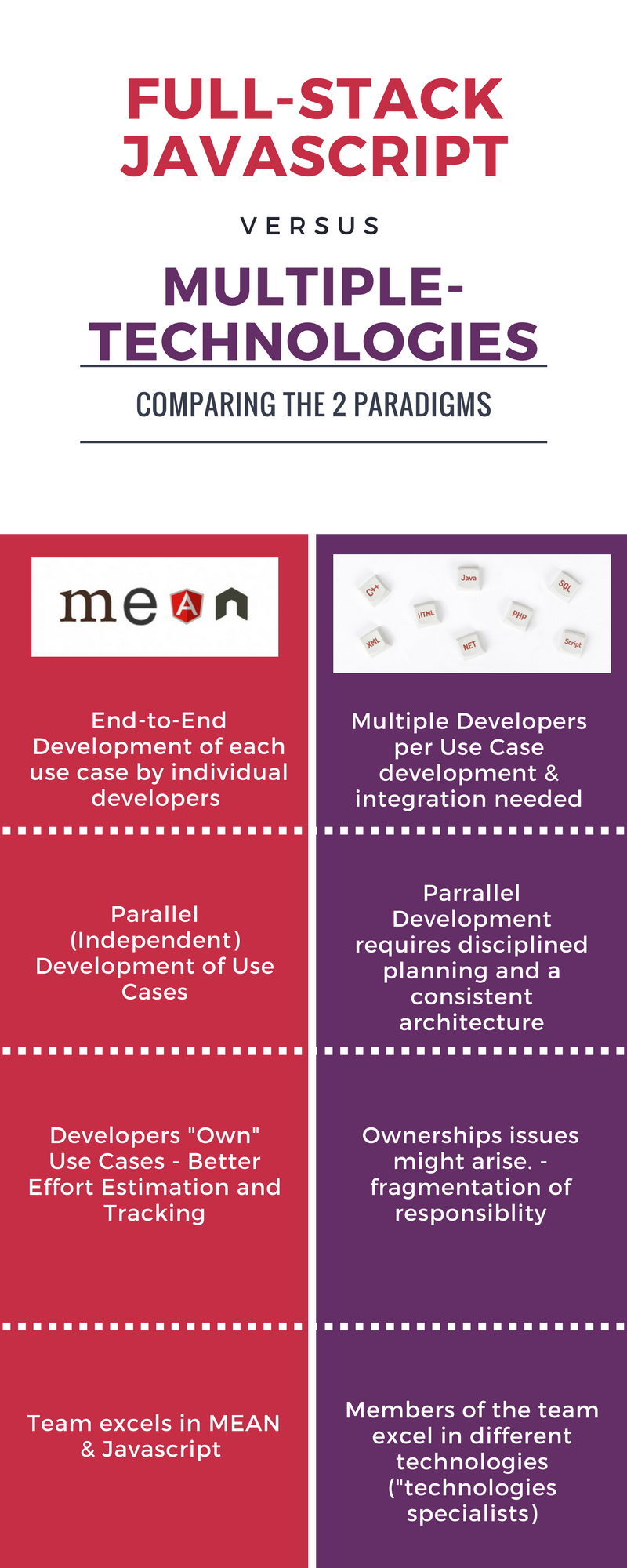Web programming has always been a complex and challenging task, especially in the case of enterprise applications requiring low-latency, performance and scalability. In order to meet such requirements web developers and web development teams need to deal with a host of technologies, spanning the areas of networking, databases, security, as well as the development of server-side and client-side components. During the past decade developers have been using tens of different web development frameworks, which span multiple programming languages such as Java, JavaScript, PHP, Python, Ruby and more. In recent years JavaScript has been gaining momentum as one of the most popular programming languages. Its use has been expanded to the development of server-side components, beyond its traditional role as the default language of the web browser. This has given rise to the expanded use of JavaScript frameworks. MEAN Stack is one of the most popular of these frameworks.
MEAN (mean.io) is an approach to end-to-end development of web applications based on the combination of four JavaScript-based technologies, namely MongoDB, Express, AngularJS and Node.js. Each of these technologies is extremely powerful for certain aspects of web application development in particular:
- MongoDB (www.mongodb.com) is an open source database, which stores and indexes data in the form of collections of documents. In this way it offers higher performance in data retrieval, when compared to conventional SQL databases which are more rigorous in terms of the data types entailed in database transactions. Data storage in MongoDB is based on BSON (Binary JavaScript Object Notation) which is the binary implementation of JSON documents.
- Express (expressjs.com) is a framework for building the server-side part of web applications using Node.js, which is another core part of the MEAN stack. It is actually becoming the standard server-side framework for Node.js, which facilitates application routing, while enabling use of templates. In this way, Express lowers the time and effort required in order to develop a web application based on Node.js.
- AngularJS (angularjs.org) expands the HTML vocabulary of web pages in order to enable dynamic views. It supports reusability of pages through templates, while enabling responsive Ajax-based pages that can are flexibly updated without a need for annoying full page reloads.
- Node.js (nodejs.org) is a JavaScript-based server-side technology. Built on top of Google Chrome’s JavaScript engine it has become the most successful server-side implementation of JavaScript, which enables web developers to code server-side modules using JavaScript. Among the main advantages of Node.js are its simplicity and performance. The latter is boosted by its support for asynchronous non-blocking I/O (Input-Output) operations.
MEAN’s rising popularity stems largely from the simplicity, flexibility and performance of the individual technologies that it comprises, which are increasingly used in the development of prominent projects. For example, Node.js has an over 100% annual growth rate, while being used in products like LinkedIn and Uber. Beyond the power and the momentum of individual technologies, several of the MEAN’s benefits stem from the combination of the four technologies in a full-stack approach. The complete MEAN Stack provides an integrated way to producing web applications, which comes with performance and flexibility advantages over other popular stacks such as the LAMP (Linux, Apache, MySQL, PHP) stack. MEAN provides flexibility in the operating system choice, higher performance in main data retrieval operations, as well as compelling performance for CPU-intensive server-side operations. Furthermore, MEAN leads to uniform, isomorphic 100% JavaScript code, which alleviates developers from the burden of understanding, combining and managing LAMP’s technologies.
As a full-stack approach, MEAN supports development of all the main elements of a web application, including client-side modules, server-side modules and data management components. It therefore alleviates web development teams from the need of mastering multiple programming languages. This can have a positive impact on project managers seeking to maximize the efficiency of their teams, through enabling them to organize complex projects on the basis of “vertical development” principles without compromising technology and code uniformity. “Vertical development” involves developers leading whole use cases and can facilitate tracking and estimation of a project’s progress. However, it is barely feasible when using multiple client-side and server-side technologies, while involving developers that tend to excel in specific technologies or application layers, rather than leading entire use cases. MEAN Stack could alleviate the challenges of “horizontal development”, which requires elaborate and time consuming planning in order to enable parallel development and maximize productivity.

Overall, no matter whether they are building a corporate web site or a complex enterprise application, Chief Information Officers (CIOs) and Project Managers should consider the merits of MEAN’s full-stack approach. MEAN ensures adoption and use of modern high-performance JavaScript technologies, ensures uniformity and facilitates project management both during initial development and when updates or changes will be required. Furthermore, MEAN is likely to reduce the number of developers required to deliver a certain project scope, along with related costs.
Despite several good reasons to go MEAN, both developers and managers should also be aware of the challenges. For developers the challenge is to acquaint themselves with multiple technologies and their integration as part of the MEAN approach. Even though everything is JavaScript based, acquaintance with a programming framework involves a learning curve. In MEAN’s case this curve can be steeper, since developers need to learn each individual framework, along with the way these frameworks are combined together. Likewise, the challenge for managers is to hire efficient MEAN developers and to manage them as part of a full-stack oriented team. The latter may require a radical shift in the team’s organizational and management paradigm. CIOs and project managers should therefore look for reliable technology partners that can effectively organize and implement MEAN Stack projects. Such partners could help their companies maximize efficiency based on the customization of the MEAN Stack to the target business requirements, beyond conventional tracking of use cases and project management milestones. JavaScript technologies and the MEAN stack are here to stay and companies should get prepared to seize their benefits.











Great article! The MEN Stack is indeed a powerful framework for full-stack development. For those interested in mastering MEAN, our courses at Code From Basics in Chennai offers in-depth training on MongoDB, Express.js, Angular, and Node.js. Whether you’re a beginner or looking to advance your skills, this course provides hands-on experience with real-world projects to build robust web applications. MEAN Stack Training in Chennai Check it out if you’re looking to enhance your development career!